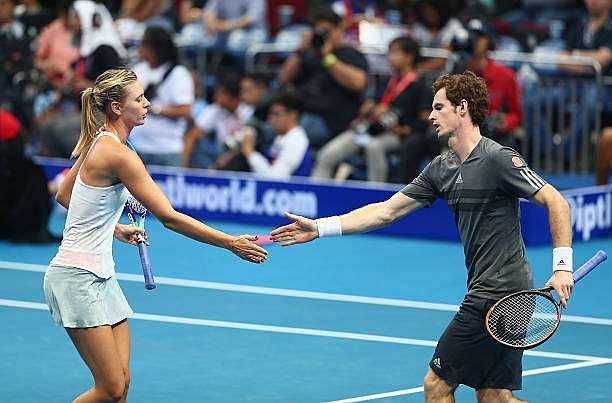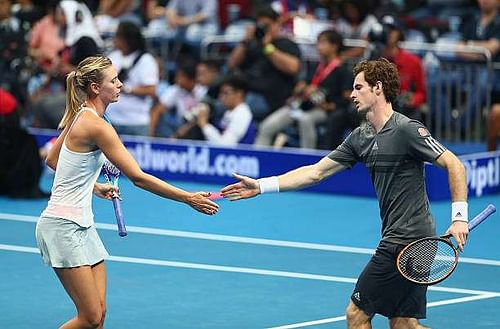
Andy Murray says Sharapova publicity is not required
What’s the story?
World No. 1 Andy Murray said in a recent interview with the BBC that Grand Slams faced “different decisions” when it came to publicizing Maria Sharapova, implying that larger tournaments – such as the upcoming French Open – need not provide a wildcard to Sharapova purely for the fans it will draw to the tournament.
"Loads and loads of press went there to cover the event - whereas the Slams don't need that coverage," Murray said in the interview, continuing that "....(it) probably doesn't change their event much either way, so they have a different decision to make."
In Case You Didn’t Know...
Sharapova received a wildcard to the recently-concluded Porsche Tennis Grand Prix in Stuttgart, Germany, where she made the finals before losing to World No. 17 Kristina Mladenovic of France, thereby moving back into the rankings at 262.
The Russian former No. 1 would have needed to finish in the finals to be able to make the top 200 rankings, which would have given her access on merit to the qualifying rounds of the French Open.
30-year-old Sharapova recently completed a 15-month ban, served out for taking meldonium, a banned substance under regulations set forth by the World Anti-Doping Agency or WADA.
Sharapova tested positive for the substance during the Australian Open of 2016, where she lost to eventual runner-up Serena Williams; she was then handed what could have been a possible 4-year ban that was later commuted to 15 months, which she finished serving on the 27th of April, 2017.
French Open organizers are as yet undecided on whether they will hand Sharapova a wildcard to the tournament, with the official announcement due on the 16th of May. The FTF are wary, they have said, of the repercussions of giving her the wildcard as they do not want to perceived as condoning the doping scandal of the previous year.
Read More: What is meldonium and how did Sharapova use it?
Heart of the Matter
Organizers at the Porsche Tennis Grand Prix handed the Russian ace an invitational wildcard to the tournament in Germany, which, although it was headlined by then World No. 1 Angelique Kerber, did not have as much publicity as it otherwise might have garnered in Sharapova’s absence, a point Murray alluded to in his interview.
Sharapova’s semi-final loss to Mladenovic means she will not be able to make up the ranking points needed to qualify for the French Open qualifiers based on merit, meaning she will necessarily need a wildcard to be able to play there.
According to the ATP World No. 1, Grand Slams already have a significant journalistic presence, and one that does not necessarily need ‘big-name’ players to be covered in the media.
Many players, among them Murray, Rafael Nadal and Jo-Wilfried Tsonga – have spoken out against Sharapova’s doping, with Canadian Wimbledon runner-up Eugenie Bouchard recently labeling the Russian a “cheater” who should not be allowed to play the sport.
Read more: French Open organizers unsure of Sharapova wildcard
Author’s Take
Much has been said on the Sharapova doping scandal, and to completely attest to Sharapova’s innocence would be naive at best. Many have said, however, that the player has served her time and should no longer be tarred with the brush of the scandal. It is often difficult, however, to lose tags such as those even though they may have been in the past, and the ban itself carries with it an air of suspicion around Sharapova’s current – and future career and form.
It is to be said, however, that downtime practice has truly paid off for the Russian – finishing in the semi-finals of one’s first tournament back in 15 months is not an easy feat. Murray echoed this, saying "[Sharapova's] playing at a level where she's capable of winning a tournament like Stuttgart already - it would be a three-, four-week period before she'd be competing at the biggest events again.”
Sharapova has also been a fan favourite and drawn large crowds in the past for various reasons, but it is easy to see how awarding her a wild card to the French Open may be construed as condoning her past behaviour.
The 2017 French Open will be significantly more sparsely populated this year, however, with the absence of some of its best players – World No. 1 Serena Williams, former No. 1 Victoria Azarenka; while Azarenka will return later this year after maternity leave, Williams will give birth to her first child this May and is due for a return in the 2018 season, her representative has confirmed.
Petra Kvitova, who is recovering from injuries sustained in a knife attack, is on the entry list at Roland Garros this year, but is not 100% sure of her participation either.
French Open organizers may cave to the pressure of ratings and ticket sales in handing Sharapova a wildcard in light of marquee absences across the board, but this decision will have to be taken carefully. One possibility is that they will give the ace a wildcard to qualifying rather than the main draw, in a move that could be seen as straddling a middle ground.
That decision will only be known to us in two weeks – so any speculation until then is just that.
What’s Next?
Sharapova will now play the Rome and Madrid Open – premier clay court tournaments – in the lead up to the French Open; she has received wildcards to both tournaments. The decision on her French Open wildcard will be announced on the 16th of May, and has already built up a significant following – fans will be able to livestream that conference.
The Russian is well-versed on clay courts, and has won the French Open twice – in 2012 and 2014.
